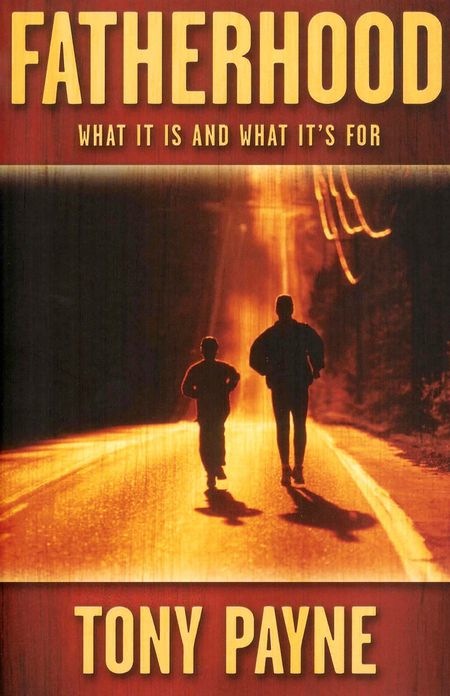
I have never been a fan of guide books, instruction manuals and in particular self-help books. That is why I particularly loved this critical and practical Christian book on "Fatherhood". It had none of the superficiality, generalisation nor false optimism of many guide books. Tony Payne succinctly goes through the biblical basis of Fatherhood and relevant advice on major Fatherhood decisions of the Christian father. Like its subtitle, the book explains what fatherhood is and what it is intended for.
Firstly, what is Fatherhood?
We live in times that refuse definitions, as if somehow making things clearer or following some pattern is intrinsically dull. Dull is the person who ignores helpful patterns, let alone what the Bible puts forth as true and relevant patterns of fatherhood. I would suggest that even Christians suspend judgement before looking at what the Bible says about Fatherhood, for otherwise it would be prejudice.
I was reminded of how fatherhood consists of creation, provision and responsibility, and authority last of all. These are certain qualities to fatherhood that are littered in the literature of the Old Testament and we find common in many non-Semitic cultures. But they need emphasis, because even these qualities are under attack from ignorance or outright redefinition. For many of us, sex is separate from creation, even sex that results in pregnancy. Add to that, in a current of absenteeism and ridicule of failed fathers/males, the idea of Father as Creator is anathema, or at least trivial. The Biblical centre of family is not surprisingly countercultural, for it lies in the father, for he is the father of his 'seed'. Children, wife, family and household revolved around the father. It is a simple picture of ownership, commitment and personal pride, not the nasty, masterful, chauvinist and manipulative caveman.
Flowing from his "creation" of children, both biological and relational, the father can provide and nurture his children. This deeply offends the non-discriminatory fighter for blind equality, without regard for what provision and nurture actually mean in the biblical sense. Why do many fathers leave after the sex act? Why are abortion clinics usually only filled with females? Who usually makes the decision to keep a pregnancy/fetus/baby (however you want to call life)? Why are hospitals, social security services, schools, tending to presume that children have mothers, and that fathers may not be there? (I know this for a fact from experience, having gone through the process of childbirth in July and having friends in the Obstetrics business and in public education) Our world just does not correlate often times with the biblical picture of father as provider and nurturer. Hopefully from the negativity we know how important care, tenderness, physical support and commitment are for families. Fathers have to be at least a central part of that. And when fathers heed the examples and exhortations in the bible, we will know that when we work, weep, lose sleep, keep patience, that we are only doing our job. The biblical form of fatherhood comes from God the Father Himself, who is our own help, and more than qualified as our model. We can't really boast, that's what I mean to say, when we do our job. Much of the world has failed, it is no excuse for Christian men to follow suit.
Authority should then be self-explanatory. Again, I find myself having to eradicate firstly abusive, fickle, violent and weak images of failed worldly fathers from our minds, before I can promote the loving, persevering, thoughtful ideal of fatherhood as the decision maker and respectable figure of authority. We all know abuses of authority and the damage they cause. But authority can be really, very good and that is the purpose of the biblical pattern: power to protect, provide and nurture. A lot of this may remind us of how fathers need the forgiveness and grace of God: that is the help of God as our own Father, who is our Creator, Provider, Carer and Lord and He has the power to give good gifts to His children who ask.
Secondly, what is fatherhood for?
You might think hasn't Tony already said it? Is there anymore? That is because we often live with a non-Christian worldview. The best advice, along with other few practical situations in family living, is that our end goal for our family is the same as our own end goal: our knowledge, growth and relationship as Jesus' disciples. So, a father who does all things but not lead others alongside himself toward Jesus Christ the Lord, in a sense fails. That is not to say that if our children turn actively away from Jesus that it is our crime. God is the Sovereign one who calls, regenerates, justifies, sanctifies and glorifies the forgiven sinner. We live alongside, teach, feed, befriend and pray for our children and spouse. But this purpose does change our priorities, plans and lifestyles. Tony then gives some short advice on just how fathers can do that, some important examples I remember are:
Remember our own daily walk, that includes our faithfulness to our wives.
Be responsible by making decisions and not leave things to someone else... such as your wife.
It takes courage.
Maintain a healthy personal life.
It really was a great encouragement, this book. I read it as my wife was in labour on July 4th, and I could not put it down. It certainly has helped prepare me and I hope to encourage the fellow guys at church to have a squeeze at it, whether they've been veterans or novices like myself.
4.5 out of 5 for me.
(image sourced from The Good Book company: http://www.thegoodbook.co.uk/Fatherhood-f_1037/largeimage)



